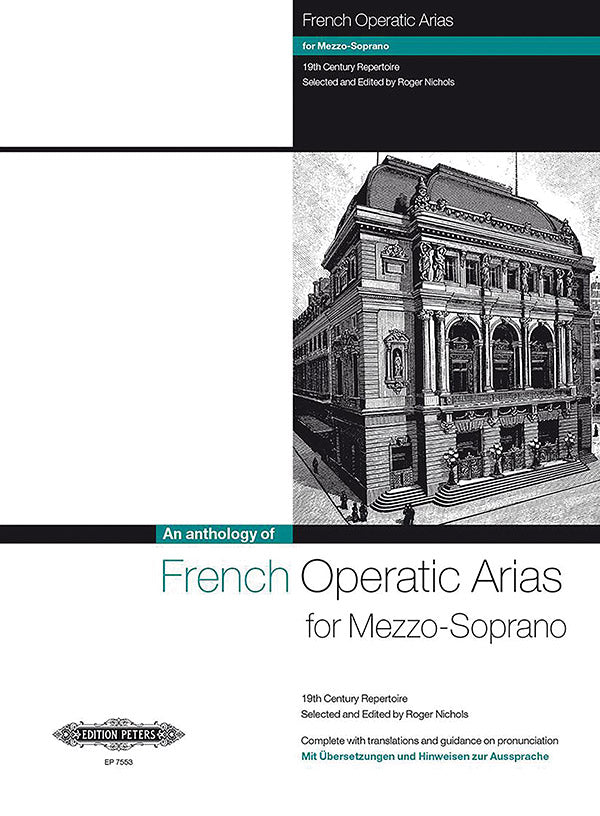French Operatic Arias for Mezzo-Soprano
19th Century Repertoire
In stock and typically ships within 1 business day.
- Composers: Camille Saint-Saëns (1835-1921), Emmanuel Chabrier (1841-1894), Hector Berlioz (1803-1869), Ambroise Thomas (1811-1896), Giuseppe Verdi (1813-1901), Giacomo Meyerbeer (1791-1864), Georges Bizet (1838-1875), Charles Gounod (1818-1893), Gaetano Donizetti (1797-1848), Jules Massenet (1842-1912)
- Instrumentation (this edition): Piano Reduction, Mezzo Soprano
- Originally for: Opera
- Work Language: French
- ISMN:
- Size: 9.0 x 12.0 inches
Description
Complete with translations and guidance on pronunciation. 'As every singer and lover of French opera knows, editions of even the best-known French operatic arias are difficult – and sometimes expensive – to obtain. Roger Nichols' scrupulously balanced selection of 19th-century French arias provides the perfect starting point for widerexploration. Nichols, who has championed French music in his writings, talks and radiobroadcasts over three decades with eloquence and scholarship, is the ideal guide to this repertoire which, even today, is often neglected, misunderstood or inadequately performed.
- Berlioz: Autrefois un roi (La damnation de Faust)
- Berlioz: D'amour l'ardente flame (La damnation de Faust)
- Berlioz: Je vais mourir (Les Troyens)
- Berlioz: Malheureux roi! (Les Troyens)
- Bizet: In vain pour éviter (Carmen)
- Bizet Habanera (Carmen)
- Biz et: Habanera (Carmen)
- Bizet: Séguedille (Carmen)
- Chabrier: Ô petite étoile (L'étoile)
- Chabrier: Hélas! À l'esclavage (Le roi malgré lui)
- Donizetti: Ô mon Fernand(La favorite)
- Gounod: Faites-lui mes aveux (Faust)
- Gounod: Toute femme tient (Le médecinmalgré lui)
- Gounod: Que fais-tu, blanche tourterelle (Roméo et Juliette)
- Massenet: Neme refuse pas! (Hérodiade)
- Massenet: Va! Laisse couler mes larmes! (Werther)
- Massenet: Werther! Werther! Werther! (Werther)
- Meyerbeer: Ah! mon fils, sois béni! ( Le prophète)
- Saint-Saëns: Amour! viens aider ma faiblesse!(Samson et Dalila)
- Saint-Saëns: Mon co eur s'ouvre à ta voix (Samson et Dalila)
- Thomas: Connais-tu le pays (Mignon)
- Verdi: Ô don fatal (Don Carlos)
Works:
- Autrefois un roi from Berlioz: La damnation de Faust, H 111, Op. 24
- D’amour l’ardente flame from Berlioz: La damnation de Faust, H 111, Op. 24
- Je vais mourir from Berlioz: Les Troyens, H 133
- Malheureux roi! from Berlioz: Les Troyens, H 133
- En vain pour éviter from Bizet: Carmen
- Habanera from Bizet: Carmen
- Séguedille from Bizet: Carmen
- Ô petite étoile from Chabrier: L'étoile (1877)
- Hélas! À l’esclavage from Chabrier: Le roi malgré lui (1887)
- Ô mon Fernand from Donizetti: La favorite, A. 58
- Faites-lui mes aveux from Gounod: Faust, CG 4
- Toute femme tient from Gounod: Le médecin malgré lui
- Que fais-tu, blanche tourterelle from Gounod: Roméo et Juliette, CG 9
- Neme refuse pas! from Massenet: Hérodiade
- Va! Laisse couler mes larmes! from Massenet: Werther
- Werther! Werther! Werther! from Massenet: Werther
- Ah! mon fils, sois béni! from Meyerbeer: Le prophète
- Amour! viens aider ma faiblesse! from Saint-Saëns: Samson and Delilah, Op. 47
- Mon co eur s’ouvre à ta voix from Saint-Saëns: Samson and Delilah, Op. 47
- Connais-tu le pays from A. Thomas: Mignon
- Ô don fatal from Verdi: Don Carlos
Publishers use a lot of words to describe what they sell, and we know it can be confusing. We've tried to be as clear as possible to make sure you get exactly what you are looking for. Below are descriptions of the terms that we use to describe the various formats that music often comes in.
Choral Score
A score for vocalists that only contains the vocal lines. The instrumental parts are not there for reference. Generally, cheaper than a vocal score and requires multiple copies for purchase.
Facsimile
Reproductions of the original hand-written scores from the composer.
Full Score
For ensemble music, this indicates that the edition contains all parts on a single system (there are not separate parts for each player). In larger ensembles, this is for the conductor.
Hardcover
Hardbound. Generally either linen-covered or half-leather.
Orchestral Parts
Similar to a wind set, this is a collection of parts. In the case of strings, the numbers listed are the number of copies included, though generally these are available individually (often with minimum quantities required).
Paperback
When publishers offer multiple bindings (e.g. hardcover) or study scores, this is the "standard" version. If you're planning to play the music, this is probably what you want.
Performance / Playing Score
A score of the music containing all parts on one system, intended for players to share. There are not separate parts for each player.
Set of Parts
For ensemble music, this indicates that there are separate individual parts for each player.
Solo Part with Piano Reduction
For solo pieces with orchestra, this is a version that contains a piano reduction of the orchestra parts. For piano pieces, two copies are typically needed for performance.
Study Score
A small (think choral size) copy of the complete score meant for studying, and not playing. They make great add-ons when learning concertos and small chamber works.
Vocal Score
A score prepared for vocalists that includes the piano/organ part or a reduction of the instrumental parts.
Wind Set
For orchestral music, this is a collection of wind and percussion parts. The specific quantities of each instrument are notated.
With Audio
In addition to the printed music, the edition contains recordings of the pieces. This may be an included CD, or access to files on the internet.
With / Without Fingering (Markings)
Some publishers prepare two copies - a pure Urtext edition that includes no fingering (or bowing) suggestions and a lightly edited version that includes a minimal number of editorial markings.


